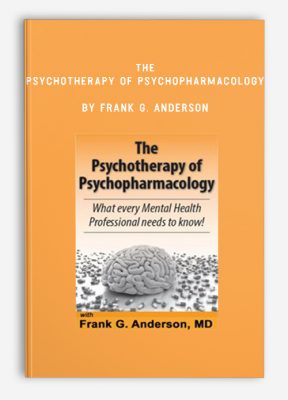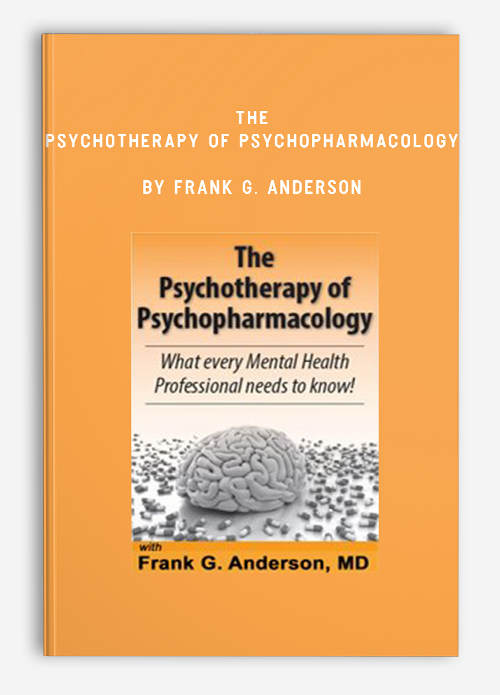The Psychotherapy of Psychopharmacology by Frank G. Anderson
$219.99 $62.00

The Psychotherapy of Psychopharmacology by Frank G. Anderson
**More information:
Get The Psychotherapy of Psychopharmacology by Frank G. Anderson at Salaedu.com
Description
Many professionals like you are intimidated by the risks associated with psychiatric medications:
- How do you know if psychiatric meds are the best choice for your client right now?
- Could a new medication provide better patient outcomes?
- Could drug side effects make your client worse?
- How do I remember the names of all these drugs and what they do?
Like most mental health professionals you imagine you play no role with your clients and their meds. But you do play an important role in the success of medications your clients take.
This workshop will teach you what you need to know to become better informed, proactive, and effective in working with clients and medications. You will:
- Determine when a psychopharmacology consultation is necessary
- Help clients effectively communicate with their prescriber
- Learn the best prescribing practices for treating depression, bipolar disorder, anxiety, PTSD, dissociation, psychotic disorders, insomnia, ADHD, and more …
- Learn how to stay involved throughout the prescribing process – increasing the likelihood of medication success
- Help clients understand that medications treat symptoms – not feeling or diagnoses
In addition, you will learn how medications work to permanently change the brain and calm down the nervous system. By simply knowing the functions of the five neurotransmitters (serotonin, norepinephrine, dopamine, glutamate and GABA), you will have a solid understanding for which medications treat which syndromes. We will also discuss the benefits and uses of alternative and complimentary medications as well as what is new and emerging in the world of psychopharmacology.
You will walk away from this workshop with all you need to know to help your clients avoid the risk of experiencing unnecessary side effects, having poor compliance, taking to many meds (poly-pharmacy) or even taking the wrong medications for their symptoms.
The Therapist’s Role
- Determining when a med consult is appropriate
- What prescribers need to hear from you
- Prepare your client to talk to their prescriber
- Working with your own feelings and beliefs about medications
Preparing your client
- Exploring your client’s hopes and fears about medications
- Help your client differentiate a psychological issue from a biological syndrome
- Uncover the roadblocks to successful treatment
Neurotransmitters and Receptors
- How medications work in the brain
- The Five Neurotransmitters: All you need to know
- Cortisol and the stress response
- Matching symptoms with the correct medications
Antidepressants
- For the treatment of depression, anxiety, PTSD, OCD and more
- SSRI’s, SNRI’s and dual agents
- Dealing with sexual side effects
- How to boost the antidepressant response
- Treating kids and the elderly
- Hormones and mood: What’s the connection?
Anti-Anxiety Medications
- Benzodiazepines- why they are so addictive?
- Why so many doctors prescribe them
- How to help clients use them appropriately and get off them safely
- What is best med for acute trauma?
Mood Stabilizers
- How they work to treat bipolar disorder, PTSD and more
- Why is compliance such a big issue?
- Dealing with the drawbacks and downsides
Antipsychotics
- For treating schizophrenia, bipolar disorder, PTSD, dissociation & more
- Why the upsurge in popularity?
- The differences between the old and new antipsychotics
- What I need to know about “metabolic syndrome?”
Meds for ADHD, Sleep Disorders and Substance Abuse
- Are they addictive? Do they actually work?
- Why are they overprescribed?
- How do I help my clients use them safely?
Exploring Alternative Treatments
- Acupuncture
- Omega 3 fatty acids
- St John’s wart
- Diet & exercise
- Light therapy
- Medical marijuana…and more!
What’s new and what’s in the pipeline?
More information about Medical:
Medicine is the science and practice of establishing the diagnosis, prognosis, treatment, and prevention of disease.
Medicine encompasses a variety of health care practices evolved to maintain and restore health by the prevention and treatment of illness.
Contemporary medicine applies biomedical sciences, biomedical research, genetics, and medical technology to diagnose, treat, and prevent injury and disease,
typically through pharmaceuticals or surgery, but also through therapies as diverse as psychotherapy, external splints and traction, medical devices, biologics, and ionizing radiation, amongst others.
Medicine has been around for thousands of years, during most of which it was an art (an area of skill and knowledge) frequently having connections to the religious and
philosophical beliefs of local culture. For example, a medicine man would apply herbs and say prayers for healing, or an ancient philosopher and physician would apply bloodletting according to the theories of humorism.
In recent centuries, since the advent of modern science, most medicine has become a combination of art and science (both basic and applied, under the umbrella of medical science).
While stitching technique for sutures is an art learned through practice, the knowledge of what happens at the cellular and molecular level in the tissues being stitched arises through science.
1 review for The Psychotherapy of Psychopharmacology by Frank G. Anderson
Add a review Cancel reply
Related products
HEALTH - FITNESS - LIFESTYLE - MEDICAL
HEALTH - FITNESS - LIFESTYLE - MEDICAL
Fast Confidence [How To Be More Confident │Confidence Building] from Sharon Melnick, Ph.D.
HEALTH - FITNESS - LIFESTYLE - MEDICAL
HEALTH - FITNESS - LIFESTYLE - MEDICAL
HEALTH - FITNESS - LIFESTYLE - MEDICAL
HEALTH - FITNESS - LIFESTYLE - MEDICAL
Fitness Mentors – Audio Lectures, Practice Tests and Study Guide for the NASM CPT Ex
HEALTH - FITNESS - LIFESTYLE - MEDICAL



![Fast Confidence [How To Be More Confident │Confidence Building] from Sharon Melnick, Ph.D.](https://tradersoffer.forex/wp-content/uploads/2017/05/Sharon-Melnick-Ph.D.-Fast-Confidence-How-To-Be-More-Confident-│Confidence-Building-220x261.png)






Trevis Trevis –
We create this shop with the mission: Bring the courses to 500 millions of people in the world, to help them awake their power and change their